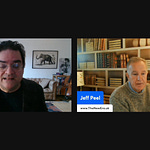It’s January. Time for memes and depression and reflections on the year that has just ended. The incentive for this piece came from a meme. And a cat meme at that. Well, perhaps it didn’t. Perhaps it was a number of things. In the middle of last year I had to move my Mum out of her home of 40 years and put her in an “independent living” flat.
She had fallen at the doorstep of her house when I was galavanting around Greece, finding myself (again). The result of her fall was that she was admitted to hospital with a broken hip. She couldn’t really return to a home with the bedrooms and only bathroom upstairs with her dodgy hip (and being 94 and living alone). Hence the “independent living” ground floor flat that she refers to as her ‘prison’. But, I digress. I’ll come back to this subject later.
But perhaps there’s time for another quick digression and partial explanation for this article.
I was in London a few weeks before Christmas and had some time to kill before meeting with a client. The meeting was in the Covent Garden area so the time-killing involved browsing the shelves of the (very large) Waterstones book shop there. I wanted a book to occupy me on the flight home. I’ve been reading a lot of books about Greece recently and when browsing the large travel writing section I came across a book by Daniel Klein called Travels with Epicurus. The book seemed to tick a number of boxes. It was ostensibly about Greece, more specifically the island of Hydra, and, more specifically still, about growing old. These are all topics that have been occupying my mind over the last year. Possibly because I’m quite old now and also because my imprisoned mother is very old and very difficult.
But I’ll return to the subject matter of Klein’s book shortly. I feel I need to tell you about the cat meme. For those of you listening to this on my Substack, I’ve redrawn the meme in the post below. But, if you can’t be bothered looking, the meme makes the point that in 2020 we all had a bunch of friends - but the number declined year by year and now we’re just left with our cat at the start of 2024.
So the meme provoked some thinking on my part. Was it the last 3 years that resulted in the loss of friendship circles for many of us? Or is this diminution of social circle merely the result of the process of ageing and associated grumpiness?
One observation I’ve made is that the people most angered by the bizarre events of the last three years all seem to be from a certain demographic. Let’s take James Delingpole as an archetype example. He’s 58. He’s distanced himself from his former mainstream media colleagues. He now describes himself as a conspiracy theorist and people who don’t really go along with his conspiracies as “normies”. Hence, his circle of friends has almost certainly diminished. I’m not sure if he has a cat. Dog perhaps.
So James Delingpole is the benchmark. Like James I’m a bloke, ostensibly middle class (although not as posh as Delingpole), much less well known, but essentially drew my income from the establishment and establishment corporations for most of my adult life. I’m also of a similar age (he’s a few years younger). I have a few friends left and have gained a few in the last few years. But, without question, my two cats are probably most fond of me. Although one of them looks at me strangely from time to time. And, of course, I’d identify with the more conspiratorial wing of the ‘freedom’ movement.
My mother has no friends but her dog. So she claims. However, she has a horde of serfs that buzz round her. She has carers four times a day - but she claims that she has no memory of any visits. It’s not so much that her memory faculties are so appalling that she can’t remember than she chooses not to register these visits as relevant or important. It’s a bit like when I call with a large bag of food. Anything that she deems to be related to her safety, nutrition, comfort or sustaining her longevity is dismissed as of no importance whatsoever. She only wants to dance, flirt or talk about potential male suitors. And this, obviously, presents a problem when the only creature who is perennially with her is her uncomplaining dog who offers her unquestioning adoration and affection. But, of course, this isn’t enough for her.
The fact is that we are more able to distract ourselves from the human condition when we’re younger. Youth, attractiveness, work, travel, money and a focus on ‘fun’ rather than fundamentals all conspire to take our minds off our fundamental loneliness.
Delingpole talks a lot about ‘bread and circuses’ as the means of distracting us from everything that’s important - like they’ve been contrived by governments. But we contrive silliness without the need for outside agency. Take away the joy of eating or the fun derived from frivolity and all we’re left with is existence - or, as my mother puts it, loneliness and isolation.
Daniel Klein apparently realises this and tries to stave off the misery. His assertion is that Epicurus, and elderly Greek men generally, tend to derive greater pleasure from old age as a result of a kinship that’s comfortable with pot bellies, bad teeth and relative indolence. They don’t quite lose their ability to admire beautiful women or an especially good beef stifado, but they’re willing to admit they’re no longer playing the game. Rewards come from the circle of old friends, an ability to embrace silence, and an acceptance that dressing to impress or running up the hills of Hydra isn’t really necessary any more. There’s no-one to impress or to be impressed.
Klein, when he wrote the book, was a little older than I am now. I suppose I’m not quite willing to admit that I’m old and past it. But I am willing to accept that it’s much easier to grow old, relatively speaking, when it’s warm, beautiful, the food tastes incredible and the BBC and Sky News are as hard to find as dark clouds on the horizon. Growing old in paradise is much more pleasant - and Greek cats are everywhere and want to be everyone’s friend.
But it’s not just about getting to an age where we wonder whether the investment of time and expense of new teeth veneers is worth it. It’s about getting to an age where we can invest wholly in the bread and circuses that are age appropriate - without getting annoyed about it. There comes a time when we need to choose to take ourselves away from the sources of annoyance. Where we choose not to participate in the discourse or debate the merits of the latest conspiracy. True, it may be problematic if the entire financial system crashes and we’re left penniless. But perhaps it’s best to pull up a chair at a table with some random old men in a taverna on a Greek island who’ve heard that Pasticcio is on today’s menu and there’s been a fresh delivery of village wine.













